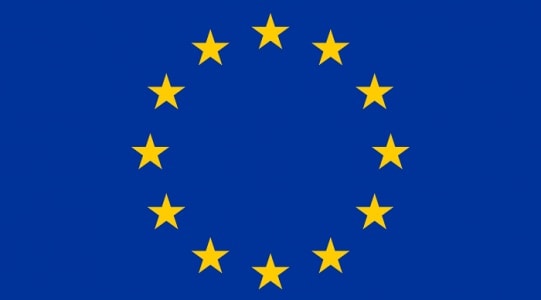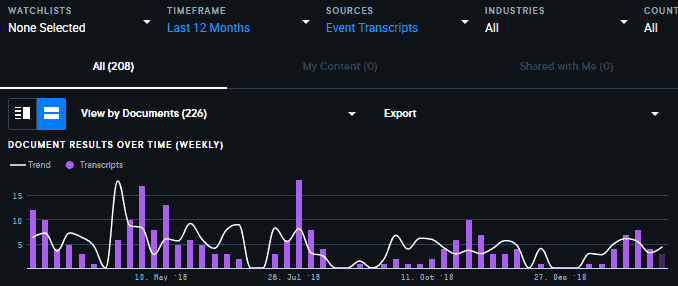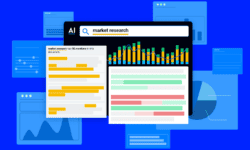The European Union’s Markets in Financial Instruments Directive II, or MiFID II, came into effect in January 2018. The new legislation places more emphasis on transparency between buy-side and sell side interactions. The regulation also changed the way buy-side firms budget and account for research consumption. This ultimately shifts focus on evaluation and prioritization of high-quality resources.
Using AlphaSense data, we took a closer look at how organizations are responding to MiFID II. For this search, we filtered to include mentions of MiFID II across Company Documents to identify relevant conversations over the last 12 months.
A closer look at Event Transcripts reveals a list of organizations that have mentioned MiFID II over the last year:
At the time this search was executed, we found:
- 106 organizations mentioned MiFID II on earnings calls over the last 12 months
- Of sectors talking about MiFID II, Financials led the way, followed by Information Technology, Healthcare, and Industrials
- Within the Financials sector, Capital Markets, Banks and Insurance ranked highest in mentions
- Organizations that mentioned MiFID II were primarily located in Europe and the United States
(AlphaSense users can access this search here )
What Are Financial Services Execs Saying About MiFID II?
Once we identified the most relevant mentions of MiFID II, we were able to quickly parse through earnings call conversations to reveal the insights we were looking for. Here are some trends we’ve identified through analyzing earnings call commentary:
Increased focus on quality and value
“I think people should be even more challenging about what they’re paying and what they’re getting for that. What value they’re actually getting? And I think it’s for us continuing to explore how we can help clients and guide clients better and better and better.” – Christopher F. Hill, CEO & Director, Hargreaves Lansdown plc (AlphaSense clients can log in to read the full transcript here).
Concerns over market share and revenue consolidation
“I think we’ve said very consistently that MiFID II is going to shrink the pool of revenue available for research, but we believe it’s going to increase the market share for very high quality research… And I think if you look at the trend over the last 4 quarters — over the 4 quarters last year…clearly, both of those things are happening.” – Ralph Lewis Schlosstein, Evercore Inc. – President, CEO & Director, Evercore, Inc. (AlphaSense clients can log in to read the full transcript here).
“So what we have seen from MiFID II is really market share consolidation, and it’s played out at one level by geography and then another level in terms of individual firms. So we’ve seen more share consolidate, and that consolidated share move out of certain of the European banks and into the U.S. banks in terms of share of equities… And so our expectation is that we’re going to continue to see that consolidation.” Stephen M. Scherr, CFO & Executive VP, The Goldman Sachs Group, Inc. (AlphaSense clients can log in to read the full transcript here).
Pricing and improved customer service
“We firmly believe any discussion about MiFID II makes sense only if you take a 360-degree approach, meaning not just paying attention to pricing, but also to the overall customer experience.” – Massimo Antonio Doris, CEO & Director, Banca Mediolanum S.p.A. (AlphaSense clients can log in to read the full transcript here).
Understanding MiFID II challenges for knowledge workers
MiFID II will continue to be a challenge for both the buy-side and sell-side. Regulations will continue to mature as firms adapt and implement new procedures for compliance across the globe. The comments above are only the beginning as changes in research consumption begin to impact the industry into 2019.







